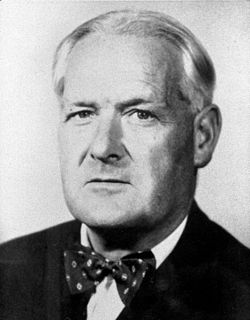A Quote by Karl Popper
The old scientific ideal of episteme - of absolutely certain, demonstrable knowledge - has proved to be an idol. The demand for scientific objectivity makes it inevitable that every scientific statement must remain tentative for ever.
Quote Topics
Related Quotes
We should stop the non-scientific, pseudo-scientific, and anti-scientific nonsense emanating from the right wing, and start demanding immediate action to reduce global warming and prevent catastrophic climate change that may be on our horizon now. We must not let the [Bush] Administration distort science and rewrite and manipulate scientific reports in other areas. We must not let it turn the Environmental Protection Agency into the Environmental Pollution Agency.
The responsibility for the creation of new scientific knowledge - and for most of its application - rests on that small body of men and women who understand the fundamental laws of nature and are skilled in the techniques of scientific research. We shall have rapid or slow advance on any scientific frontier depending on the number of highly qualified and trained scientists exploring it.
Groups do not have experiences except insofar as all their members do. And there are no experiences... that all the members of a scientific community must share in the course of a [scientific] revolution. Revolutions should be described not in terms of group experience but in terms of the varied experiences of individual group members. Indeed, that variety itself turns out to play an essential role in the evolution of scientific knowledge.
Rhetoric is useful because the true and the just are naturally superior to their opposites, so that, if decisions are improperly made, they must owe their defeat to their own advocates; which is reprehensible. Further, in dealing with certain persons, even if we possessed the most accurate scientific knowledge, we should not find it easy to persuade them by the employment of such knowledge. For scientific discourse is concerned with instruction, but in the case of such persons instruction is impossible.
I do not believe that a moral philosophy can ever be founded on a scientific basis. … The valuation of life and all its nobler expressions can only come out of the soul’s yearning toward its own destiny. Every attempt to reduce ethics to scientific formulas must fail. Of that I am perfectly convinced.
All scientific work is incomplete - whether it be observational or experimental. All scientific work is liable to be upset or modified by advancing knowledge. That does not confer upon us a freedom to ignore the knowledge we already have, to postpone action that it appears to demand at a given time. Who knows, asks Robert Browning, but the world may end tonight? True, but on available evidence most of us make ready to commute on the 8:30 next day.
Unfortunately, philosophers of science usually regard scientific realism and scientific anti-realism as monistic doctrines. The assumption is that there is one goal of all scientific inference - finding propositions that are true, or finding propositions that are predictively accurate. In fact, there are multiple goals. Sometimes realism is the right interpretation of a scientific problem, while at other times instrumentalism is.








































